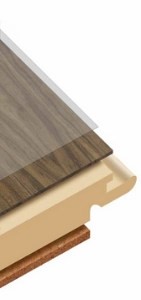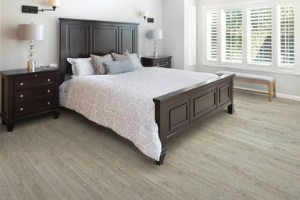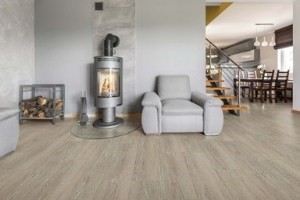Vinyl flooring is all the rage and for good reasons. Vinyl has come a long way since its original introduction in the 1930’s. There are now options that look and feel so real many mistakenly think they are hardwood. In addition to the realistic wood-texture, many are also waterproof or highly water resistant.
LVP stands for Luxury Vinyl Plank and LVT stands for Luxury Vinyl Tile. As the name implies, Luxury Vinyl Planks look like planks of hardwood floors, and Luxury Vinyl Tile looks like tile or natural stone. They are individual pieces of vinyl (not sheet vinyl), so they look very similar to the real thing.

Luxury vinyl is durable, affordable, and a beautiful alternative to hardwood flooring. It is suited for a variety of residential and commercial applications, and, when installed correctly, perfectly mimics the look, texture and warmth of real wood. There are multiple types and forms of luxury vinyl and different grades. The less expensive ones are often water resistant, rather than waterproof.
Another acronym you will hear if you are shopping for luxury vinyl is EVP or Engineered Vinyl Plank. It’s a segment of Luxury Vinyl Flooring that has an incredibly realistic hardwood look (and feel) and is exceptionally durable. It is waterproof and has a strong high-density fiberboard core.

Engineered vinyl plank is much thicker than the typical glue down vinyl. It is usually 8 mm thick, so it is similar to an engineered hardwood or laminate flooring. Like an engineered floor it is constructed in layers. The top layer is vinyl, the middle is a high-density core board and usually there is an attached back underlayment (e.g.cork) for more cushioning. These floors are clickable so they are easy to install. Engineered vinyl plank has become a new alternative vs more expensive engineered hardwood flooring, and a more attractive and more resilient option.

Luxury Vinyl Then: Years ago, luxury vinyl was only available in a glue down form. These products were glued down directly to a concrete sub-floor or plywood. They are thin so they when they are glued directly to a concrete sub-floor, they just lay on top of it without providing any cushioning.
Because the vinyl can be thin, imperfections in the sub-floor can show through. It became critical to smooth out the floor before installing vinyl.
Years later, they started to come out with variations on these products where the vinyl was “floating.” Floating means the floor is not glued or attached to the sub-floor. This made it easier for novices and do-it-yourselfers to install.
The problems with these initial products is they were not very durable. Many would curl up over time (especially if the area got damp or wet), and if the sub-floor wasn’t even, the pieces wouldn’t line up, and then over time as the floor was used more, the pieces would separate and create tripping hazards.
Luxury Vinyl Now: Today, you will find luxury vinyl easier to install and enjoy in your home. Many products come with under-pad attached. Repairs and replacement planks and tiles can be done without having to replace the entire floor! Luxury vinyl is still vinyl and that makes it super easy to keep clean! With hundreds of stylish colours and patterns you’re sure to find the floor that suits your home, business or cottage decor.
It is incredible how real these products look. Many people mistake it for hardwood and the attached under-pad makes it feel like a real floor. Waterproof. Yes! This is a huge benefit as it holds up to moisture and water. Engineered luxury vinyl performs great in areas prone to water such as kitchens, basements and mudrooms. More economical. Generally, this is less expensive vs hardwood or tile.


